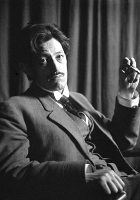Sadakichi Hartmann
Sadakichi Hartmann Poems
Sadakichi Hartmann Biography
Carl Sadakichi Hartmann (November 8, 1867 - November 22, 1944) was a critic and poet of German and Japanese descent. Hartmann, born on the artificial island of Dejima, Nagasaki as the son of the German businessman Carl Herman Oskar Hartmann and Osada Hartmann and raised in Germany, became an American citizen in 1894. An important early participant in modernism, Hartmann was a friend of such diverse figures as Walt Whitman, Stéphane Mallarmé and Ezra Pound. His poetry, deeply influenced by the Symbolists as well as orientalist literature, includes 1904's Drifting Flowers of the Sea and Other Poems, 1913's My Rubaiyat and 1915's Japanese Rhythms. His works of criticism include Shakespeare in Art (1901) and Japanese Art (1904). During the 1910s, Hartmann let himself be crowned King of the Bohemians by Guido Bruno in New York's Greenwich Village. Hartmann wrote some of the earliest English language haiku. He was also one of the first critics to write about photography, with regular essays in Alfred Stieglitz's Camera Notes. Later years found him living in Hollywood and Banning, California. He made a brief appearance in the Douglas Fairbanks film The Thief of Bagdad as the court magician. In 1944, he died while visiting his daughter in St. Petersburg, Florida.)
The Best Poem Of Sadakichi Hartmann
Tanka
Winter? Spring? Who knows?
White buds from the plumtrees wing
And mingle with the snows.
No blue skies these flowers bring,
Yet their fragrance augurs Spring.
Oh, were the white waves,
Far on the glimmering sea
That the moonshine laves,
Dream flowers drifting to me,—
I would cull them, love, for thee.
Moon, somnolent, white,
Mirrored in a waveless sea,
What fickle mood of night
Urged thee from heaven to flee
And live in the dawnlit sea?
Like mist on the leas,
Fall gently, oh rain of Spring
On the orange trees
That to Ume's casement cling—
Perchance, she'll hear the love-bird sing.
Though love has grown cold
The woods are bright with flowers,
Why not as of old
Go to the wildwood bowers
And dream of- bygone hours!
Tell, what name beseems
These vain and wandering days!
Like the bark of dreams
That from souls at daybreak strays
They are lost on trackless ways.
